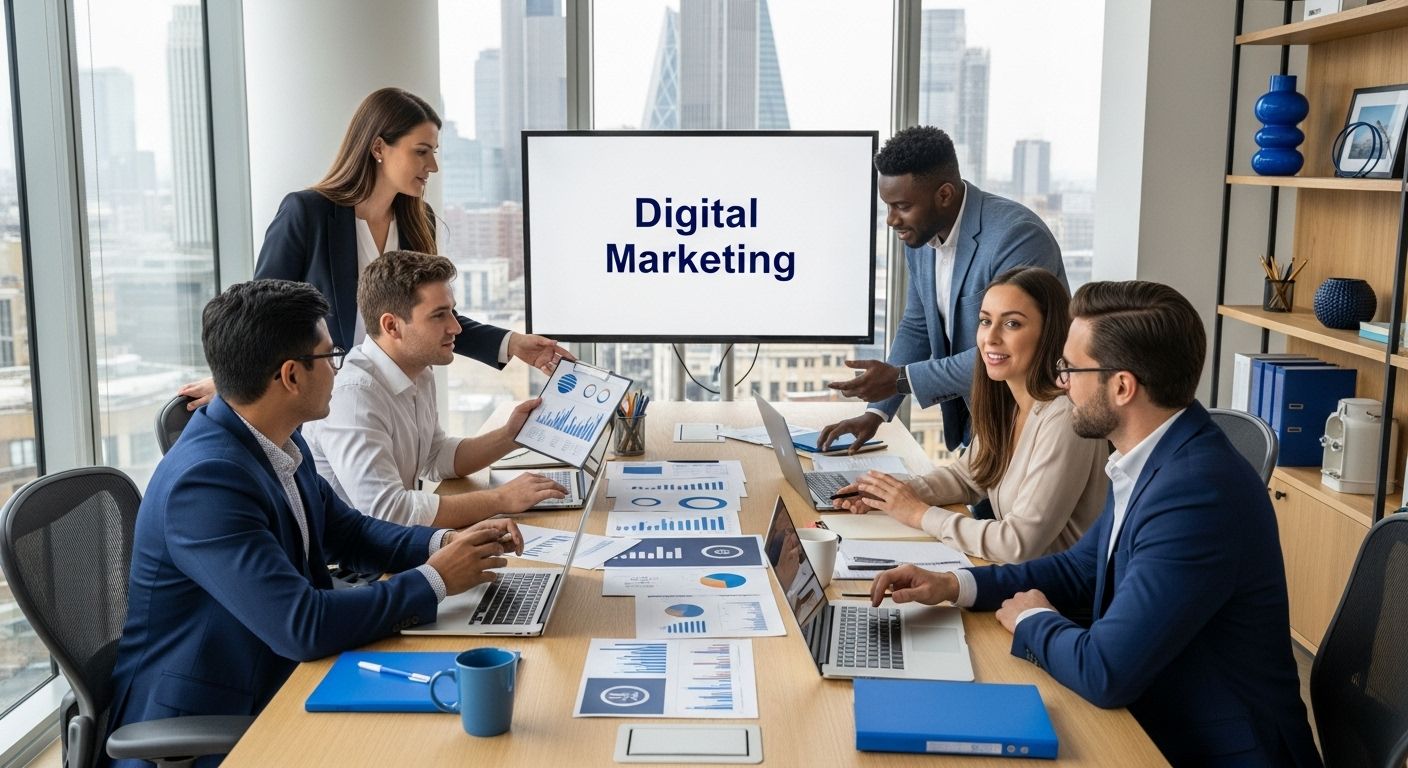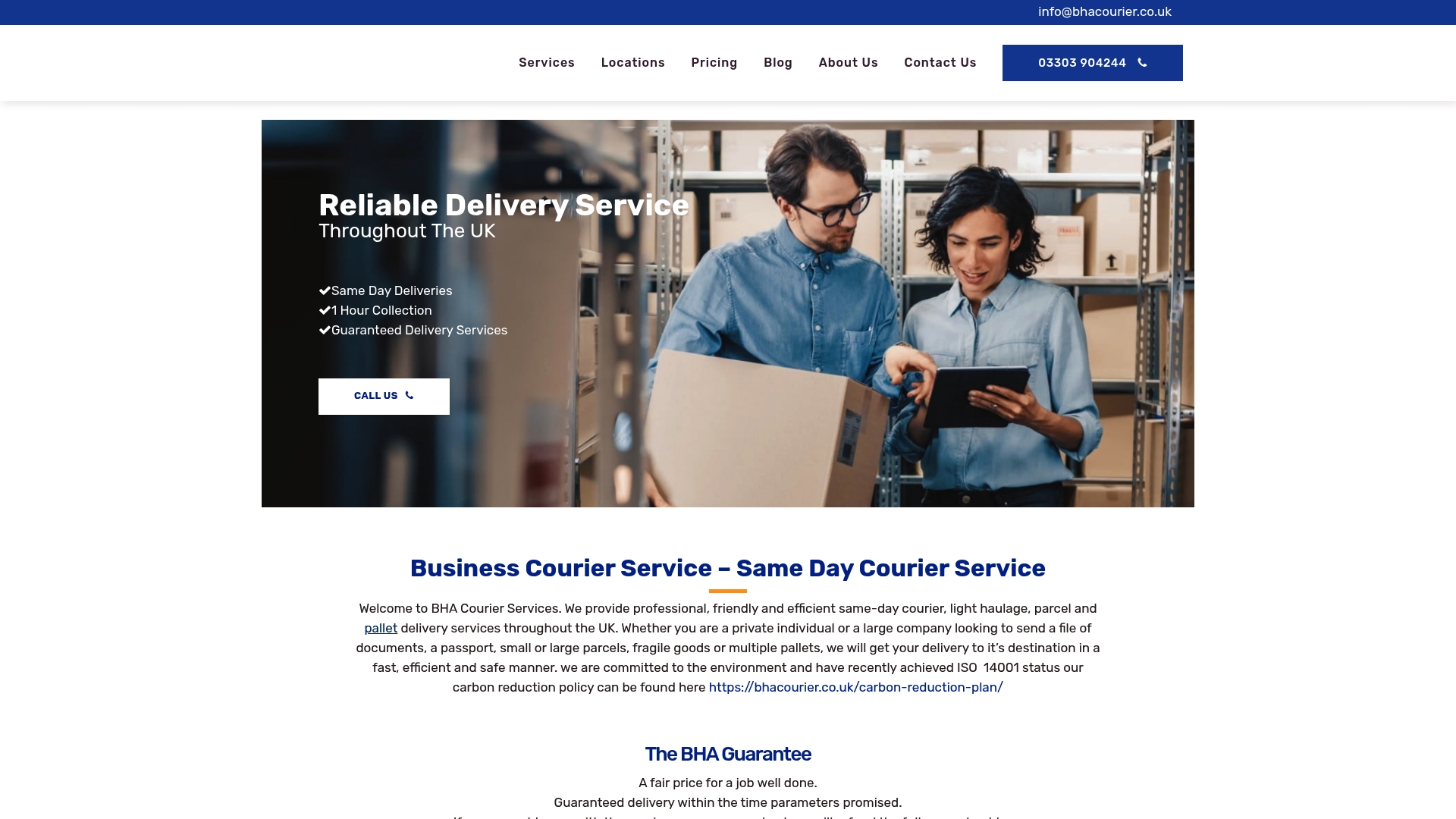
07 Aug Digital Marketing for SMEs in the UK: 2025 Success Guide
UK small and medium businesses are facing a make-or-break moment as digital marketing becomes the new battleground for survival. Yet despite the rush to go online, only 37 percent of UK SMEs actually manage their digital services effectively. Most think tech equals instant growth, but the biggest difference comes from smart strategy and skill-building, not just new tools. The real winners in 2025 will be those who master resourceful marketing over shiny platforms.
Table of Contents
- Why Digital Marketing Matters For Smes
- Best Digital Marketing Channels For Uk Businesses
- Crafting A Cost-Effective Strategy For Smes
- Common Challenges And Quick Solutions
Quick Summary
| Takeaway | Explanation |
|---|---|
| Digital marketing is essential for SMEs’ growth | Embracing digital marketing strategies can enhance visibility and customer engagement, crucial for sustainability in competitive markets. |
| Social media channels drive engagement | Understanding unique advantages of platforms like LinkedIn and Instagram is key for targeting specific audiences effectively. |
| Cost-effective advertising maximises returns | Prioritising high-ROI channels and utilising free tools allows SMEs to achieve significant marketing impact without overspending. |
| Continuous learning enhances digital skills | Investing in training and development helps SMEs overcome digital capability barriers and improves overall marketing effectiveness. |
| Address internal challenges for marketing success | Fostering a collaborative environment and managing change strategically ensures smoother adoption of digital marketing initiatives. |
Why Digital Marketing Matters for SMEs
Small and medium-sized enterprises (SMEs) in the United Kingdom are increasingly recognising digital marketing as a critical pathway to business survival and growth. The digital landscape has transformed how businesses connect with customers, compete in their markets, and drive sustainable revenue.
The Strategic Advantage of Digital Marketing
Digital marketing provides SMEs with unprecedented opportunities to level the competitive playing field. According to research from ResearchGate, digital marketing tools significantly improve visibility, customer acquisition, and long-term business growth for smaller organisations.
Traditionally, marketing was dominated by businesses with substantial financial resources. Today, digital platforms offer cost-effective strategies that allow even the smallest enterprises to reach targeted audiences. Social media, search engine optimisation, and targeted online advertising enable SMEs to compete directly with larger corporations without massive marketing budgets.
Digital Resilience in Challenging Times
The COVID-19 pandemic dramatically accelerated digital transformation across industries. Research published by the National Institutes of Health highlights that digital marketing adoption correlates strongly with business resilience during market disruptions. SMEs that quickly adapted their digital marketing strategies demonstrated greater innovation and revenue stability.
Digital marketing is no longer optional but essential. It provides SMEs with multiple strategic advantages:
- Precise Audience Targeting: Digital platforms allow businesses to reach specific demographics with unprecedented accuracy.
- Measurable Results: Unlike traditional marketing, digital channels offer real-time analytics and performance tracking.
- Cost-Effective Engagement: Smaller marketing budgets can generate significant returns through strategic digital campaigns.
Building Digital Marketing Foundations
Successful digital marketing requires a comprehensive approach. SMEs must develop integrated strategies that combine multiple channels and touchpoints. This includes website optimisation, content marketing, social media presence, email campaigns, and data-driven advertising.
The key is not just being present online but creating meaningful, engaging experiences that convert potential customers. By understanding digital marketing fundamentals, SMEs can transform their online presence from a mere necessity to a powerful growth engine.
Business owners seeking to enhance their digital marketing approach can explore our comprehensive guide on business communication channels to develop more effective digital strategies.
As the digital marketplace continues evolving, SMEs that embrace digital marketing will be best positioned to thrive in an increasingly competitive business environment. The future belongs to those who can effectively leverage digital tools to connect, communicate, and convert.
Best Digital Marketing Channels for UK Businesses
In the rapidly evolving digital marketing landscape, UK businesses must strategically select channels that deliver maximum engagement and return on investment. Not all digital platforms are created equal, and understanding the nuanced effectiveness of each channel is crucial for SMEs seeking competitive advantage.
Social Media Marketing: The Connection Engine
Social media platforms have transformed from mere communication tools to powerful marketing ecosystems. According to Hootsuite’s Digital 2023 Report, over 57 million active social media users in the UK present a massive opportunity for targeted digital marketing strategies.
Each social platform offers unique advantages for SMEs. LinkedIn provides professional networking and B2B marketing opportunities, Facebook enables precise demographic targeting, Instagram drives visual storytelling, and Twitter facilitates real-time engagement. The key is understanding which platforms align most closely with your specific business objectives and target audience demographics.
Below is a summary table comparing the unique advantages of major social media platforms for UK SMEs:
| Platform | Primary Audience | Key Advantage | Typical Use Case |
|---|---|---|---|
| Professionals, B2B | Networking & Industry Authority | B2B marketing, recruitment | |
| Broad, 18-65+ | Precise Demographic Targeting | Community building, events | |
| 18-35, visually-driven | Visual Storytelling | Product promotion, branding | |
| News-seekers, professionals | Real-Time Engagement | Customer service, updates |
Search Engine Marketing and Content Strategy
Search engine marketing represents a critical digital channel for UK businesses. Research from Statista indicates that search engine advertising and organic content marketing continue to dominate digital marketing investment strategies.
Effective search engine marketing involves a multifaceted approach:
- Organic SEO: Developing high-quality, relevant content that ranks naturally in search results
- Pay Per Click (PPC) Advertising: Targeted ads that appear in search engine results
- Local SEO: Optimising digital presence for geographic-specific searches
Business owners looking to refine their communication strategies can explore our comprehensive guide on business communication channels for deeper insights into digital marketing tactics.
Email and Emerging Digital Channels
Despite predictions of its demise, email marketing remains a powerful digital channel. Personalised, segmented email campaigns continue to deliver impressive engagement rates for SMEs. Emerging channels like WhatsApp Business, podcasting, and interactive video content are also gaining significant traction among UK businesses.
The most successful digital marketing strategies will integrate multiple channels, creating a cohesive ecosystem that provides consistent messaging and multiple touchpoints for potential customers. SMEs must remain adaptable, continuously testing and refining their digital marketing approaches to stay competitive in an increasingly digital marketplace.
By understanding and effectively leveraging these digital marketing channels, UK businesses can create meaningful connections, drive engagement, and ultimately transform digital interactions into sustainable business growth.

Crafting a Cost-Effective Strategy for SMEs
For small and medium-sized enterprises (SMEs) in the United Kingdom, developing a digital marketing strategy that maximises impact while minimising expenses is crucial. Budget constraints need not limit marketing potential when strategic approaches are implemented thoughtfully.
Strategic Resource Allocation
Research from the European Commission’s Digital Economy and Society Index highlights that successful SMEs leverage cost-effective digital marketing approaches by strategically integrating affordable tools and platforms. The key is not spending more, but spending smarter.
Effective cost management in digital marketing involves:
- Prioritising High-ROI Channels: Focus on platforms offering maximum engagement with minimal investment
- Leveraging Free and Low-Cost Tools: Utilise open-source analytics, social media management, and marketing platforms
- Implementing Targeted Campaigns: Develop precise, narrow marketing efforts that reach specific audience segments
Maximising Digital Marketing Efficiency
According to guidance from the US Small Business Administration, SMEs should concentrate on scalable digital strategies that provide clear, measurable returns. This means selecting marketing channels and tools that offer transparent performance metrics and direct business impact.
Digital marketing efficiency can be achieved through:
- Organic social media content creation
- Search engine optimisation techniques
- Email marketing automation
- Targeted local advertising
The following table summarises cost-effective marketing strategies and their main benefits for SMEs:
| Strategy | Description | Main Benefit |
|---|---|---|
| Organic Social Media Content | Non-paid posts and interactions on social platforms | Builds engagement for free |
| Search Engine Optimisation (SEO) | Improving website visibility in search results | Increases organic traffic |
| Email Marketing Automation | Automated email sequences for targeted lists | Personalises communication |
| Targeted Local Advertising | Ads focused on local audiences and geographies | Maximises local relevance |
| Free & Low-Cost Digital Tools | Utilising open-source or free marketing platforms | Reduces tech expenses |
Technology and Skill Development
Investing in digital skills and cost-effective technologies is equally important. SMEs can develop internal marketing capabilities through online training, free webinars, and collaborative learning platforms. This approach reduces external consulting costs while building long-term organisational digital competence.
Small business shipping experts recommend integrating marketing strategies with operational efficiencies to further reduce overall business expenses.
The most successful SMEs will view digital marketing not as an expense, but as a strategic investment. By carefully selecting channels, leveraging affordable technologies, and continuously learning, businesses can create powerful marketing approaches that deliver substantial results without excessive financial strain.
Ultimately, a cost-effective digital marketing strategy is about understanding your unique business needs, audience, and available resources. It requires creativity, strategic thinking, and a willingness to experiment and adapt continuously.

Common Challenges and Quick Solutions
Digital marketing presents numerous challenges for small and medium-sized enterprises (SMEs) in the United Kingdom. Understanding these obstacles and developing strategic solutions is crucial for successful digital transformation and marketing effectiveness.
Digital Capability and Expertise Barriers
Research from the British Chambers of Commerce highlights that 37% of UK SMEs struggle with managing multiple digital service providers and technological integrations. This complexity often creates significant barriers to effective digital marketing implementation.
Key challenges in digital capabilities include:
- Limited Technical Knowledge: Many SME owners lack comprehensive digital marketing expertise
- Resource Constraints: Insufficient budget and personnel to manage complex digital strategies
- Technology Integration: Difficulty connecting different digital marketing tools and platforms
Overcoming Technological Resistance
The UK government’s SME Digital Adoption Taskforce identified critical barriers preventing digital technology adoption, including perceived high costs, expertise gaps, and technological transition risks.
Quick solutions for SMEs include:
- Investing in affordable online training programmes
- Utilising free digital marketing resources and tutorials
- Partnering with local digital skills training centres
- Gradually implementing new technologies to reduce transition stress
Internal Change Management
Research from the University of Leeds emphasises that digital transformation involves more than technological implementation. Successfully navigating digital marketing requires managing internal relationships and organisational culture.
Strategies for effective change management include:
- Creating a collaborative digital learning environment
- Encouraging open communication about technological challenges
- Developing incremental implementation plans
- Celebrating small digital marketing victories
When unexpected challenges arise in business operations, adaptability and strategic problem-solving become crucial skills.
Below is a table outlining common digital marketing challenges for UK SMEs and practical solutions suggested in the article:
| Challenge | Barrier Description | Quick Solutions |
|---|---|---|
| Limited Technical Knowledge | Lack of digital expertise | Online training, free tutorials |
| Resource Constraints | Budget/personnel limitations | Utilise free tools, focus on high-ROI activities |
| Technology Integration | Difficulty linking systems/platforms | Gradual implementation, seek support locally |
| Technological Resistance | Hesitance to adopt new tech | Training, phased adoption, local digital skill centres |
| Internal Change Management | Organisational or cultural resistance | Collaborative environment, celebrate small wins |
Successful digital marketing for SMEs requires a holistic approach that combines technological understanding, continuous learning, and adaptive strategies. By recognising common challenges and implementing targeted solutions, UK businesses can transform potential obstacles into opportunities for growth and innovation.
The journey towards digital marketing excellence is not about perfection but persistent improvement and willingness to learn and adapt in an ever-changing digital landscape.
Frequently Asked Questions
Why is digital marketing important for SMEs in the UK?
Digital marketing is essential for SMEs as it enhances visibility, engages customers, and drives sustainable revenue growth. In today’s competitive market, effective digital marketing strategies level the playing field for smaller businesses against larger corporations.
What are the best digital marketing channels for SMEs?
The best digital marketing channels for SMEs include social media platforms like LinkedIn and Instagram for engagement, search engine marketing for visibility, and email marketing for direct communication with customers. Choosing the right channels depends on your target audience and business goals.
How can SMEs create a cost-effective digital marketing strategy?
To create a cost-effective digital marketing strategy, SMEs should focus on high-ROI channels, leverage free tools, and implement targeted campaigns. It’s important to allocate resources smartly and continuously evaluate marketing efforts for efficiency.
What challenges do SMEs face in digital marketing?
SMEs often face challenges such as limited technical knowledge, resource constraints, and difficulties in technology integration. Addressing these issues through affordable training, collaboration, and incremental implementation can help overcome barriers and improve digital marketing effectiveness.
Unlock Growth for Your SME: Seamless Delivery Makes Digital Marketing Thrive
Are digital marketing challenges slowing your business momentum? Many SMEs in the UK struggle to balance engaging potential customers online while managing the practical realities of fulfilment and time-sensitive deliveries. The article highlights that a strong, coordinated approach to both marketing and operations is key to standing out in a crowded market. If your digital strategy is driving new orders and leads, but delays and delivery headaches threaten customer trust, it is time to bridge the gap between your online presence and real-world performance.

Choose BHA Courier as your reliable partner for secure, same-day and next-day parcels, document deliveries and more. With nationwide coverage and guaranteed collection and arrival times, you can reassure your customers that every online promise is backed by best-in-class logistics. Ready to deliver on your digital commitments? Visit our main site today and discover how seamless, trusted delivery can help your marketing efforts turn into lasting customer loyalty. Keep your business moving forward by making every digital interaction count.


